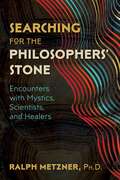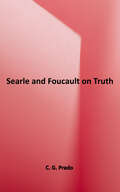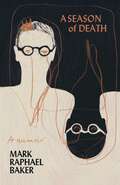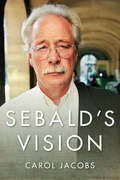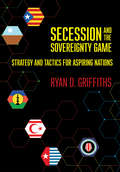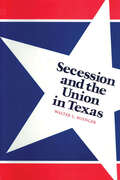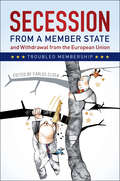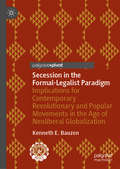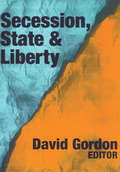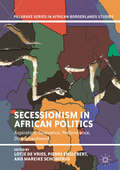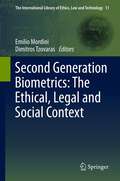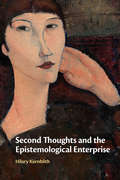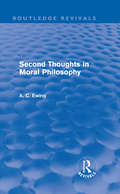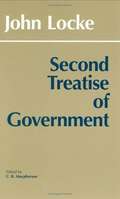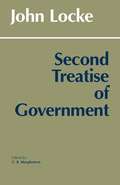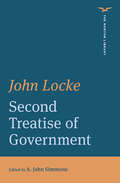- Table View
- List View
Searching for the Divine in Plato and Aristotle: Philosophical Theoria and Traditional Practice
by Julie K. WardTo scholars of ancient philosophy, theoria denotes abstract thinking, with both Plato and Aristotle employing the term to signify philosophical contemplation. Yet it is surprising for some to find an earlier, traditional meaning referring to travel to festivals and shrines. In an attempt to dissolve the problem of equivocal reference, Julie Ward's book seeks to illuminate the nature of traditional theoria as ancient festival-attendance as well as the philosophical account developed in Plato and Aristotle. First, she examines the traditional use referring to periodic festivals, including their complex social and political arrangements, then she considers the subsequent use by Plato and Aristotle. Broadly speaking, she discerns a common thread running throughout both uses: namely, the notion of having a visual experience of the sacred or divine. Thus her book aims to illuminate the nature of philosophical theoria described by Plato and Aristotle in light of traditional, festival theoria.
Searching for the Philosophers' Stone: Encounters with Mystics, Scientists, and Healers
by Ralph MetznerA deeply personal account of the scientific, shamanic, and metaphysical encounters that led to the development of Metzner’s psychological methods • Recounts the author’s meetings and friendships with Albert Hofmann, Alexander Shulgin, the McKenna brothers, Wilson Van Dusen, Myron Stolaroff, and Leo Zeff • Details his lucid dream encounters with G. I. Gurdjieff, profoundly healing sessions with Hawaiian healer Morrnah Simeona, experiences with plant teachers iboga and ayahuasca, and ecological and mystical lessons learned from animal teachers • Shares his involvement in the beginnings of the therapeutic use of MDMA and how it safely and effectively supports the healing of trauma, PTSD, and interpersonal relationships Just as the search for the philosopher’s stone is the core symbol of the alchemical tradition, Ralph Metzner, Ph.D., psychotherapist and one of the respected elders of the psychedelic research community, sees it as the central metaphor of his life-long quest to find methods of healing and insight through heightened states of consciousness. Through captivating stories Metzner shares his encounters from the 1960s through the 1990s with genius scientists, shamanic healers, mystics, plant spirits, and animal guides that led to the development of his “alchemical divination” psychological methods, a structured intuitive process of accessing inner sources of healing and insight. He details lessons learned with psychedelic research legends Albert Hofmann, Alexander Shulgin, Terence McKenna, and Dennis McKenna. He reveals his deeply healing encounters with the Kahuna bodywork healer Morrnah Simeona, the first to introduce the Hawaiian Ho’oponopono healing method to the West, and his experiences with West African trance dancing and the psychoactive plant-drug iboga. Metzner recounts in vivid detail his unwelcome encounter with malignant sorcery during an ayahuasca experience in Ecuador and the lessons it taught him about connections with spirits, both harmful and beneficial. He tells of his involvement in the beginnings of the therapeutic use of MDMA and shows how it is an effective and safe substance to support psychotherapy for healing trauma, PTSD, and interpersonal relationships. In sharing his remarkable encounters, Metzner shows how the most meaningful lessons in the alchemy of life come not only from the geniuses we meet but also from the spirits we encounter along the way.
Searching for the Self (The Library of Wisdom and Compassion #7)
by His Holiness the Dalai Lama Venerable Thubten ChodronHis Holiness the Dalai Lama explores emptiness, one of the most central teachings in Buddhism, in the newest volume of the bestselling series The Library of Wisdom and Compassion.In Searching for the Self the Dalai Lama leads us to delve deeply into the topic of the ultimate nature of reality, presenting it from a variety of approaches while focusing on identifying our erroneous views and directing us to the actual mode of existence of all persons and phenomena. Placing our study of reality within the auspicious context of a compassionate motivation to benefit all sentient beings, the Dalai Lama explains why realizing emptiness is important and what qualities are needed to do that, and he evaluates various tenet systems&’ perspectives on this vast topic. He then helps us understand our perceptions and the mental states involved in both our ignorant and accurate cognitions. He examines inherent existence and other fantasized ways of existence that we seek to disprove through reasoned analysis and presents the Middle Way view that abandons all extremes. The closing chapters by Thubten Chodron discuss the three characteristics of impermanence, unsatisfactoriness, and not-self as explained in the Pali tradition and show how meditation on these can lead to the meditative breakthrough to realize nirvana. Engaging in this investigation with His Holiness will challenge our deepest-held beliefs and uproot false ways of viewing ourselves and the world that are so habitual we don&’t even notice them. Get ready to be challenged and intrigued, for realizing the nature of reality has the power to cut our defilements at the root and free us from cyclic existence forever!
Searle and Foucault on Truth
by C. G. PradoThis book compares John Searle and Michel Foucault's radically opposed views on truth in order to demonstrate the need for invigorating cross-fertilization between the analytic and Continental philosophical traditions. By pressing beyond familiar clichés about analytic philosophy and postmodernism, a surprising convergence of Searle and Foucault's thoughts on truth emerges. The analytic impression of Foucault is of a radical relativist whose views on truth entail linguistic idealism. Searle himself has contributed to this impression through his aggressive critique of postmodern thinkers, especially Derrida. Prado lays this misperception to rest, showing analytic philosophers that Foucault's ideas about truth are defensible and merit serious attention, while also demonstrating to Continental philosophers that Searle's cannot be ignored.
Season of Death: A Memoir
by Mark Raphael BakerMark Raphael Baker was no stranger to death. Over seven years he had become a mourner three times over: for his first wife, for his brother and for his father. When diagnosed with pancreatic cancer, he began to reflect on their deaths, his probable death and on Death as, in the words of Ecclesiastes, a 'season' that produced a large and bitter harvest for the Baker family. Powerful and conflicting emotions assailed him, but their destructive power was always defeated by his love of his family and of life, which never deserted him even when his spirit was most weary. Over the short course of his illness, he came to realise that to love both truly, he must die as the most authentic version of himself he can achieve. It enabled him to die with humbling grace and dignity. In A Season of Death, readers of The Fiftieth Gate and Thirty Days will rediscover the many forms of Mark's humour, his candour and his depth of thought and feeling, albeit in a different key, as it must be when those virtues reveal themselves in expressions of vulnerability that fend off self-pity. There is profound sorrow in this memoir but there is matching joy and much love, interwoven by a fine writer and thinker into a story that will deepen one's understanding of life.
Sebald's Vision (Literature Now)
by Carol JacobsW. G. Sebald's writing has been widely recognized for its intense, nuanced engagement with the Holocaust, the Allied bombing of Germany in WWII, and other episodes of violence throughout history. Through his inventive use of narrative form and juxtaposition of image and text, Sebald's work has offered readers new ways to think about remembering and representing trauma.In Sebald's Vision, Carol Jacobs examines the author's prose, novels, and poems, illuminating the ethical and aesthetic questions that shaped his remarkable oeuvre. Through the trope of "vision," Jacobs explores aspects of Sebald's writing and the way the author's indirect depiction of events highlights the ethical imperative of representing history while at the same time calling into question the possibility of such representation. Jacobs's lucid readings of Sebald's work also consider his famous juxtaposition of images and use of citations to explain his interest in the vagaries of perception. Isolating different ideas of vision in some of his most noted works, including Rings of Saturn, Austerlitz, and After Nature, as well as in Sebald's interviews, poetry, art criticism, and his lecture Air War and Literature, Jacobs introduces new perspectives for understanding the distinctiveness of Sebald's work and its profound moral implications.
Secession Debated: Georgia's Showdown in 1860
by William W. Freehling Craig M. SimpsonThe critical northern antebellum debate matched the rhetorical skills of Abraham Lincoln and Stephen A. Douglas in an historic argument over the future of slavery in a westward-expanding America. Two years later, an equally historic oratorical showdown between secessionists and Unionists in Georgia generated as much popular interest south of the Mason-Dixon line, and perhaps had an even more profound immediate effect on the future of the United States.With Abraham Lincoln's "Black Republican" triumph in the presidential election of 1860 came ardent secessionist sentiment in the South. But Unionists were equally zealous and while South Carolina--a bastion of Disunionism since 1832--seemed certain to secede; the other fourteen slave states were far from decided. In the deep South, the road to disunion depended much on the actions of Georgia, a veritable microcosm of the divided South and geographically in the middle of the Cotton South. If Georgia went for the Union, secessionist South Carolina could be isolated. So in November of 1860 all the eyes of Dixie turned to tiny Milledgeville, pre-war capital of Georgia, for a legislative confrontation that would help chart the course toward civil war.In Secession Debated, William W. Freehling and Craig M. Simpson have for the first time collected the seven surviving speeches and public letters of this greatest of southern debates over disunion, providing today's reader with a unique window into a moment of American crisis. Introducing the debate and debaters in compelling fashion, the editors help bring to life a sleepy Southern town suddenly alive with importance as a divided legislature met to decide the fate of Georgia, and by extension, that of the nation. We hear myriad voices, among them the energetic and self-righteous governor Joseph E. Brown who, while a slaveholder and secessionist, was somewhat suspect as a native North Georgian; Alexander H. Stephens, the eloquent Unionist whose "calm dispassionate approach" ultimately backfired; and fiery secessionist Robert Toombs who, impatient with Brown's indecisiveness and the caution of the Unionists, shouted to legislators: "Give me the sword! but if you do not place it in my hands, before God! I will take it." The secessionists' Henry Benning and Thomas R.R. Cobb as well as the Unionists Benjamin Hill and Herschel Johnson also speak to us across the years, most with eloquence, all with the patriotic, passionate conviction that defined an era. In the end, the legislature adopted a convention bill which decreed a popular vote on the issue in early January, 1861. The election results were close, mirroring the intense debate of two months before: 51% of Georgians favored immediate secession, a slim margin which the propaganda-conscious Brown later inflated to 58%. On January 19th the Georgia Convention sanctioned secession in a 166-130 vote, and the imminent Confederacy had its Southern hinge.Secession Debated is a colorful and gripping tale told in the words of the actual participants, one which sheds new light on one of the great and hitherto neglected verbal showdowns in American history. It is essential to a full understanding of the origins of the war between the states.
Secession and the Sovereignty Game: Strategy and Tactics for Aspiring Nations
by Ryan D. GriffithsSecession and the Sovereignty Game offers a comprehensive strategic theory for how secessionist movements attempt to win independence. Combining original data analysis, fieldwork, interviews with secessionist leaders, and case studies on Catalonia, the Murrawarri Republic, West Papua, Bougainville, New Caledonia, and Northern Cyprus, Ryan D. Griffiths shows how the rules and informal practices of sovereign recognition create a strategic playing field between existing states and aspiring nations that he terms "the sovereignty game." To win sovereign statehood, all secessionist movements have to maneuver on the same strategic playing field while varying their tactics according to local conditions. To obtain recognition, secessionist movements use tactics of electoral capture, nonviolent civil resistance, and violence. To persuade the home state and the international community, they appeal to normative arguments regarding earned sovereignty, decolonization, the right to choose, inherent sovereignty, and human rights. The pursuit of independence can be enormously disruptive and is quite often violent. By advancing a theory that explains how sovereign recognition has succeeded in the past and is working in the present, and by anticipating the practices of future secessionist movements, Secession and the Sovereignty Game also prescribes solutions that could make the sovereignty game less conflictual.
Secession and the Union in Texas
by Walter L. BuengerIn 1845 Texans voted overwhelmingly to join the Union. They voted just as overwhelmingly to secede in 1861. The story of why and how that happened is filled with colorful characters, such as the aged Sam Houston, and with the southwestern flavor of raiding Comanches, German opponents of slavery, and a border with Mexico. Texas was unique among the seceding states because of its ambivalence toward secession. Yet for all its uniqueness the story of the secession of Texas has broad implications for the secession movement in general. Despite the local color and the southwestern nature of the state, Texas was more southern than western in 1860. Texans supported the Union or insisted upon secession for reasons common to the South and to the whole nation. Most Texans in 1860 were recent immigrants from southern and border states. They still thought and acted like citizens of their former states. The newness of Texas then makes it a particularly appropriate place from which to draw conclusions about the entire secession movement. Secession and the Union in Texas is both a narrative of secession in Texas and a case study of the causes of secession in a southern state. Politics play a key role in this history, but politics broadly defined to include the influence of culture, partisanship, ideology, and self-interest. As any study of a mass movement carried out in tense circumstances must be, this is social history as well as political history. It is a study of public hysteria, the pressure for consensus, and the vanishing of a political process in which rational debate about secession and the Union could take place. Although relying primarily on traditional sources such as manuscript collections and newspapers, a particularly rich source for this study, the author also uses election returns, population shifts over the course of the 1850s, and the breakdown of population within Texas counties to provide a balanced approach. These sources indicate that Texans were not simply secessionists or unionists. At the end of 1860 Texans ranged from ardent secessionists to equally passionate supporters of the Union. But the majority fell in between these two extremes, creating an atmosphere of ambivalence toward secession which was not erased even by the war. In 1845 Texans voted overwhelmingly to join the Union. They voted just as overwhelmingly to secede in 1861. The story of why and how that happened is filled with colorful characters, such as the aged Sam Houston, and with the southwestern flavor of raiding Comanches, German opponents of slavery, and a border with Mexico. Texas was unique among the seceding states because of its ambivalence toward secession. Yet for all its uniqueness the story of the secession of Texas has broad implications for the secession movement in general. Despite the local color and the southwestern nature of the state, Texas was more southern than western in 1860. Texans supported the Union or insisted upon secession for reasons common to the South and to the whole nation. Most Texans in 1860 were recent immigrants from southern and border states. They still thought and acted like citizens of their former states. The newness of Texas then makes it a particularly appropriate place from which to draw conclusions about the entire secession movement. Secession and the Union in Texas is both a narrative of secession in Texas and a case study of the causes of secession in a southern state. Politics play a key role in this history, but politics broadly defined to include the influence of culture, partisanship, ideology, and self-interest. As any study of a mass movement carried out in tense circumstances must be, this is social history as well as political history. It is a study of public hysteria, the pressure for consensus, and the vanishing of a political process in which rational debate about secession and the Union could take place. Although relying primarily on traditional sources such as manuscript collections and newspapers, a particularly rich source for this study, the author a...
Secession from a Member State and Withdrawal from the European Union: Troubled Membership
by Carlos ClosaThis is the first book to jointly scrutinise two existential issues for the EU: withdrawal of a member state (i. e. Brexit) and territorial secession (affecting Scotland, Catalonia and beyond). The book applies normative and empirical analysis, explores new approaches and discusses the deep theoretical problems unleashed by these processes. Featuring a superb constellation of legal and political science scholars, the book combines specific legal analysis and considers the political dynamics behind the processes. It provides extensive coverage and sophisticated analysis of the interpretation of Article 50 and the possible consequences it may have. The implications of withdrawal and secession on EU citizenship are discussed in depth and there is an overview of the evolving nature of the relationship between the regions and the EU. Finally, there is an engaging normative discussion on the deeper meaning of these two processes with respect to the objective of European integration.
Secession in the Formal-Legalist Paradigm: Implications for Contemporary Revolutionary and Popular Movements in the Age of Neoliberal Globalization
by Kenneth E. BauzonThis book explores how formal-legalism, as the dominant paradigm of explanation, has sought to explain the phenomenon of secessionism among its practitioners as a problem for the modern state. This study bears how these practitioners have, over time, described, defined, and proposed to solve secessionism and related political problems within the logic of their paradigm. In the process, the book reconstructs the formalist worldview and the practitioners’ fundamental presuppositions which, to them, render comprehensible and meaningful the occurrence of events, like secession, as well as means of dealing with it. More significantly, the book exposes a debilitating flaw of formal-legalist paradigm as it fails to account for other principles of mobilization in political and social life that defy formal-legal rules such as those based on race, ethnicity, language, culture, and material factors. Narrow adherence to textual sources and the literal approach, have led formal-legalists to miss, willfully ignore, or endorse the paradigm's strategic association with state power, evolving since the dawn of the Enlightenment. Formal-legalism has lent itself amenable to the interests of the state and to the variable construction of the meaning of the law devoid of original spirit and universality but conforming with the specific interests of the state or, for that matter, the prevailing American empire, both spatially and temporally. Accounting for this anomaly, the historical materialist perspective is considered, with appropriate historical and contemporary illustrations, as a relevant explanatory alternative to the now-obsolescent formal-legalist paradigm. With the assumption that, indeed, economic and material considerations such as those demanded by the dominant class elements within the state underlie the rationale for the state, formal-legalism has evolved from one that initially provided a presumed objective view of society to one that has subjectively become an essential part of the cultural suprastructure that allows these elements to command the state as a principal tool for labor- and value-extraction during what is popularly known as contemporary neoliberal globalization.
Secession, State, and Liberty
by David GordonThe political impulse to secede - to attempt to separate from central government control - is a conspicuous feature of the post-cold war world. It is alive and growing in Canada, Russia, China, Italy, Belgium, Britain, and even the United States Yet secession remains one of the least studied and least understood of all historical and political phenomena. The contributors to this volume have filled this gap with wide-ranging investigations - rooted in history, political philosophy, ethics, and economic theory - of secessionist movements in the United States, Canada, and Europe.
Secessionism and Separatism in Europe and Asia: To Have a State of One’s Own (Politics in Asia)
by Jean-Pierre Cabestan Aleksandar PavkovićThe boundaries between secessionism and separatism are often blurred, and in many cases study of secessionism encompasses that of separatism and vice versa. Recognising this inherent relationship, this book provides a comparative survey of recent attempts at secession and separatist movements from across Europe and Asia, and assesses the responses of the respective host governments. The essays address two main questions which arise from the relationship between state governments and secessionist movements: first, how secessionist or separatist movements gather support and mobilize their target populations and second, how central political authorities respond to the challenges that secessionist or separatist movements pose to their capacity to control the country. With political analysis of recent cases ranging from the Balkans, the USSR, the UK and the Basque Country, to Sri Lanka, Burma, China, Tibet and Taiwan, the authors identify both similarities and differences in the processes and outcomes of secessionist and separatist movements across the two distinct regions. This volume will be an invaluable resource for those who wish to understand the dynamics of secessionist movements and as such will appeal to students and scholars of Asian and European politics, comparative politics, international relations and conflict studies. It will also be helpful to practitioners and policy-makers who wish to understand and contribute to the resolution of such conflicts.
Secessionism in African Politics: Aspiration, Grievance, Performance, Disenchantment (Palgrave Series in African Borderlands Studies)
by Mareike Schomerus Lotje De Vries Pierre EnglebertSecessionism perseveres as a complex political phenomenon in Africa, yet often a more in-depth analysis is overshadowed by the aspirational simplicity of pursuing a new state. Using historical and contemporary approaches, this edited volume offers the most exhaustive collection of empirical studies of African secessionism to date. The respected expert contributors put salient and lesser known cases into comparative perspective, covering Biafra, Katanga, Eritrea and South Sudan alongside Barotseland, Cabinda, and the Comoros, among others. Suggesting that African secessionism can be understood through the categories of aspiration, grievance, performance, and disenchantment, the book's analytical framework promises to be a building block for future studies of the topic.
Second Generation Biometrics: The Ethical, Legal and Social Context
by Dimitros Tzovaras Emilio MordiniWhile a sharp debate is emerging about whether conventional biometric technology offers society any significant advantages over other forms of identification, and whether it constitutes a threat to privacy, technology is rapidly progressing. Politicians and the public are still discussing fingerprinting and iris scan, while scientists and engineers are already testing futuristic solutions. Second generation biometrics - which include multimodal biometrics, behavioural biometrics, dynamic face recognition, EEG and ECG biometrics, remote iris recognition, and other, still more astonishing, applications - is a reality which promises to overturn any current ethical standard about human identification. Robots which recognise their masters, CCTV which detects intentions, voice responders which analyse emotions: these are only a few applications in progress to be developed. This book is the first ever published on ethical, social and privacy implications of second generation biometrics. Authors include both distinguished scientists in the biometric field and prominent ethical, privacy and social scholars. This makes this book an invaluable tool for policy makers, technologists, social scientists, privacy authorities involved in biometric policy setting. Moreover it is a precious instrument to update scholars from different disciplines who are interested in biometrics and its wider social, ethical and political implications.
Second Handbook of Academic Integrity (Springer International Handbooks of Education)
by Sarah Elaine EatonThe book brings together diverse views from around the world and provides a comprehensive overview of academic integrity and how to create the ethical academy. At the same time, the Handbook does not shy away from some of the vigorous debates in the field such as the causes of academic integrity breaches. There has been an explosion of interest in academic integrity in the last 20-30 years. New technologies that have made it easier than ever for students to ‘cut and paste’, coupled with global media scandals of high profile researchers behaving badly, have resulted in the perception that plagiarism is ‘on the rise’. This, in combination with the massification and commercialisation of higher education, has resulted in a burgeoning interest in the importance of academic integrity, how to safeguard it and how to address breaches appropriately. What may have seemed like a relatively easy topic to address – students copying sources without attribution – has in fact, turned out to be a complex, interdisciplinary field of research requiring contributions from linguists, psychologists, social scientists, anthropologists, teaching and learning specialists, mathematicians, accountants, medical doctors, lawyers and philosophers, to name just a few.Because of this broad interest and input, this handbook serves as the single authoritative reference work which brings together the vast, growing, interdisciplinary and at times contradictory body of literature. For both established researchers/practitioners and those new to the field, this Handbook provides a one-stop-shop as well as a launching pad for new explorations and discussions.
Second International Handbook of Educational Change
by David Hopkins Andy Hargreaves Michael Fullan Ann LiebermanThe two volumes of the second edition of the International Handbook of Educational Change comprise a totally new, and updated collection of the most critical and cutting-edge ideas in educational change. Written by the most influential thinkers in the field, these volumes cover educational change at both the theoretical and practical levels. The updated handbook remains connected to the classical concerns of the field, such as educational innovation, reform, and change management, and also offers new insights into educational change that have been brought about by social change and shifting contexts of educational reform. Like the first best selling Handbook, this one will also undoubtedly become an essential resource for people involved in all spheres of education, from classroom teachers, teacher leaders and administrators to educational researchers, curriculum developers, and university professors. No other work provides such a wide-ranging and comprehensive examination of the field of educational change.
Second International Handbook of Lifelong Learning
by Karen Evans Richard Bagnall David N. Aspin Judith ChapmanThe second edition of the International Handbook of Lifelong Learning is extensive, innovative, and international in scope, remit and vision, inviting its readers to engage in a critical re-appraisal of the theme of "lifelong learning". It is a thorough-going, rigorous and scholarly work, with profound and wide-ranging implications for the future of educating institutions and agencies of all kinds in the conception, planning and delivery of lifelong learning initiatives. Lifelong learning requires a wholly new philosophy of learning, education and training, one that aims to facilitate a coherent set of links and pathways between work, school and education, and recognises the necessity for government to give incentives to industry and their employees so they can truly "invest" in lifelong learning. It is also a concept that is premised on the understanding of a learning society in which everyone, independent of race, creed or gender, is entitled to quality learning that is truly excellent. This book recognises the need for profound changes in education and for goals that are critically important to education, economic advancement, and social involvement. To those concerned about the future of our society, our economy and educational provision, this book provides a richly illuminating basis for powerful debate. Drawing extensively on policy analyses, conceptual thinking and examples of informed and world-standard practice in lifelong learning endeavours in the field, both editors and authors seek to focus readers' attention on the many issues and decisions that must be addressed if lifelong learning is to become a reality for us all.
Second International Handbook of Science Education
by Campbell J. Mcrobbie Barry J. Fraser Kenneth TobinThe International Handbook of Science Education is a two volume edition pertaining to the most significant issues in science education. It is a follow-up to the first Handbook, published in 1998, which is seen as the most authoritative resource ever produced in science education. The chapters in this edition are reviews of research in science education and retain the strong international flavor of the project. It covers the diverse theories and methods that have been a foundation for science education and continue to characterize this field. Each section contains a lead chapter that provides an overview and synthesis of the field and related chapters that provide a narrower focus on research and current thinking on the key issues in that field. Leading researchers from around the world have participated as authors and consultants to produce a resource that is comprehensive, detailed and up to date. The chapters provide the most recent and advanced thinking in science education making the Handbook again the most authoritative resource in science education.
Second International Research Handbook on Values Education and Student Wellbeing (Springer International Handbooks of Education)
by Terence Lovat Kerry Dally Neville Clement Ron ToomeyThis collection applies the principles underlying values education to addressing the many social and learning challenges that impinge on education today . Insights in the fields of social and emotional learning, student wellbeing, and, increasingly, educational neuroscience have demonstrated that values education represents an efficacious pedagogy with holistic effects on students across a range of measures, including social, emotional, and intellectual outcomes. With schools in the 21st century confronting issues such as gender identity, stemming radicalism, mental health, equity for disadvantaged groups, bullying, respect, and the meaning of consent, values education offers a way of teaching and learning that integrates and enhances student’s affective and cognitive functioning. The earlier edition of this book has become a standard reference for scholars and practitioners in the fields of values education, moral education, and character education. Its citation rates, reads and downloads have been consistently and enduringly high, as have those of its companion text, Values Pedagogy and Student Achievement. A decade on, the main purpose of the revised edition is to update and incorporate new research and practice relevant to values education. Recent insights in the fields of neuroscience and social and emotional learning and their implications for education and student wellbeing are more overt than they were when the first edition was being compiled. Additionally, advanced thinking in the field of epistemology, how humans come to know and therefore learn, has also sharpened, especially through the later writings of prominent scholars like Jurgen Habermas. The revised edition has preserved the essential spirit and thrust of the original edition while making space for some of these new insights about the potential of values education to establish optimal and harmonious learning and social environments for both students and teachers.
Second Thoughts and the Epistemological Enterprise
by Hilary KornblithWhat happens when we have second thoughts about the epistemic standing of our beliefs, when we stop to check on beliefs which we have already formed or hypotheses which we have under consideration? In the essays collected in this volume, Hilary Kornblith considers this and other questions about self-knowledge and the nature of human reason. The essays draw extensively on work in social psychology to illuminate traditional epistemological issues: in contrast with traditional Cartesian approaches to these issues, Kornblith engages with empirically motivated skeptical problems, and shows how they may be constructively addressed in practical and theoretical terms. As well as bringing together ten previously published essays, the volume contains two entirely new pieces that engage with ideas of self and rational nature. Kornblith's approach lays the foundations for further development in epistemology that will benefit from advances in our understanding of human psychology.
Second Thoughts in Moral Philosophy (Routledge Revivals)
by Alfred C EwingFirst published in 1959, this volume follows on from Dr. A. C. Ewing’s earlier work, The Definition of Good. The book does not apologize or undermine Ewing’s previous publication but after further consideration on the topic, it explores the issues that were arguably overlooked in the original book. For example, it looks at the possibility of intermediate positions which have been developed since the philosophers Moore and Ross did their main work. Ewing also responds to the criticisms that originated from The Definition of Good and suggests that Secondary Thoughts in Moral Philosophy makes his reading on the topic more balanced.
Second Treatise of Government
by John Locke C. B. MacphersonThe central principles of what today is broadly known as political liberalism were made current in large part by Locke's "Second Treatise of Government" (1690). The principles of individual liberty, the rule of law, government by consent of the people, and the right to private property are taken for granted as fundamental to the human condition now. Most liberal theorists writing today look back to Locke as the source of their ideas. Some maintain that religious fundamentalism, "post-modernism," and socialism are today the only remaining ideological threats to liberalism. To the extent that this is true, these ideologies are ultimately attacks on the ideas that Locke, arguably more than any other, helped to make the universal vocabulary of political discourse.
Second Treatise of Government
by John Locke C. B. MacphersonThe Second Treatise is one of the most important political treatises ever written and one of the most far-reaching in its influence.In his provocative 15-page introduction to this edition, the late eminent political theorist C. B. Macpherson examines Locke's arguments for limited, conditional government, private property, and right of revolution and suggests reasons for the appeal of these arguments in Locke's time and since.
Second Treatise of Government (The Norton Library #0)
by John LockeAbout Second Treatise of Government Edited by A. John Simmons, “one of our most distinguished theorists of political obligation” (Jeremy Waldron), the Norton Library edition of Locke’s Second Treatise of Government features the complete text of the sixth (1764) edition, which incorporated all of Locke’s corrections to previous editions. Punctuation has been altered and spelling modernized wherever necessary to eliminate ambiguity and make the text more readable. Extensive endnotes explain obscure terms and references and clarify Locke’s arguments. A thorough introduction situates the work in historical and intellectual context and, most importantly, traces its major themes and arguments to help readers approach “the greatest English philosopher[‘s]” (Antony Flew) most influential work with confidence and understanding.

